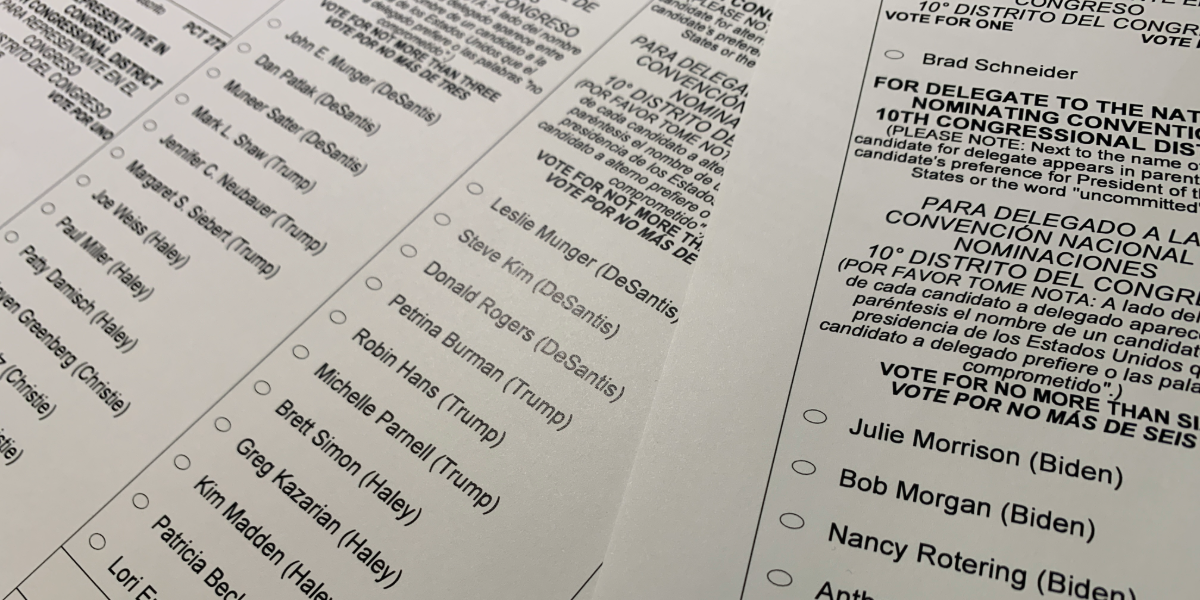|
As early voting began this week at locations across Lake County, some voters found themselves wondering about the choices on their General Primary Election ballot.
“Voters may be less familiar with some of the down-ballot races,” said Vernon Area Public Library spokesperson Catherine Savage. “‘Delegates to the National Nominating Convention’ or ‘Precinct Committeeperson,’ for example.” Fortunately for the patrons of the Vernon Area Public Library, the library is helping voters navigate the 2024 election cycle by tapping the expertise of University of Illinois Chicago associate professor of Political Science & Psychology Alexandra Filindra, Ph.D., who is serving as a “Political Scientist in Residence” for the library. She recently responded to some questions about the spring ballot from library patrons: (Q): “Delegates to the national nominating convention” — what am I voting for? What happens if the candidate that wins the popular vote is different from the delegates who were elected? How does a person get to be a prospective delegate? (A) FILINDRA: The nominating conventions are party events so who ends up the nominee of the party depends on the party primary results and the other rules of the party. Each party has different ways of selecting delegates. You can find the Illinois Democratic Party’s plan on their website at http://ILdems.com. The Republican party’s rules are available on Ballotpedia (http://ballotpedia.org). Political parties have the sole authority to determine who their nominee is going to be. When a party does not have an incumbent president on the ticket (and the current situation today of both parties having someone who has been in the White House is very unusual), it is often the case that one candidate doesn’t secure all the delegates needed to win the nomination. In such a case, we may have a contested or a “brokered convention.” Most famously, the 1924 Democratic convention that pitted Al Smith against William McAdoo led to 103 rounds of balloting and took 17 days. Q: When the ballot says “Vote For One” and there's only one name, obviously my vote isn't going to make a difference whether they are selected or not. Is there any point in this exercise? A: Yes, there is. It tells the other parties, other candidates and voters that this person may be vulnerable, and the other party should field a candidate in the next election. Parties sometimes do not run candidates because they think they have no chance of winning. But if someone runs unopposed and wins with only a small proportion of all votes cast, that is important information. Q: “Precinct Committeeperson” — What do these folks do? A: This is a party representative at the local level (the “precinct”), and their job is to be the liaison between the party and the individual voter. Responsibilities of the post include facilitating voter registration and absentee ballot access; leading get-out-the-vote outreach efforts; distributing campaign and party literature; promoting the party; and addressing voter concerns. In many states Precinct Captains are also eligible to establish party unit committees for fundraising. “Fun fact,” added Filindra, “In Chicago, Michelle Obama’s father was a precinct captain and she got her first exposure to politics when he took her along to his rounds around the precinct.” Additional Information Throughout 2024, Filindra will lead lectures, provide recommended reading and create opportunities for library patrons to increase their understanding of US government and the election process. Through the end of March, a self-guided exhibit entitled “Know Your Local Government” is on display in the library lobby. The exhibit features an overview from Filindra, along with content from the villages of Lincolnshire and Buffalo Grove, Vernon Township, and Lake County. Visitors are invited to engage with an interactive “Why I Love my Community” display. Finally, a recording of Filindra’s January lecture at the library, “Election Literacy 2024: Political Process & Psychology,” is viewable on the library’s YouTube channel. About Filindra Dr. Alexandra Filindra holds a Ph.D. in political science from Rutgers University and served as a post-doctoral researcher at Brown University’s Taubman Center for Public Policy and American Institutions and the Center for the Study of Human Development. Her work has appeared in the Journal of Politics, Political Behavior, Policy Studies Journal, Regional Studies, State Politics and Policy Quarterly, Harvard Education Review, Migration Studies, International Migration and other scholarly journals.
0 Comments
Leave a Reply. |
Recent Posts
|
HoursThe building and drive-up window are open.
Mon–Thurs 9 AM–9 PM Fri–Sat 9 AM–5 PM Sunday 10 AM–5 PM 'Mask Required' access available before opening hours, daily. Learn more. Holidays and other closed dates |
Stay InformedSign up to receive email updates from the library, including news and notice of upcoming programs.
|
Quick LinksContact |





